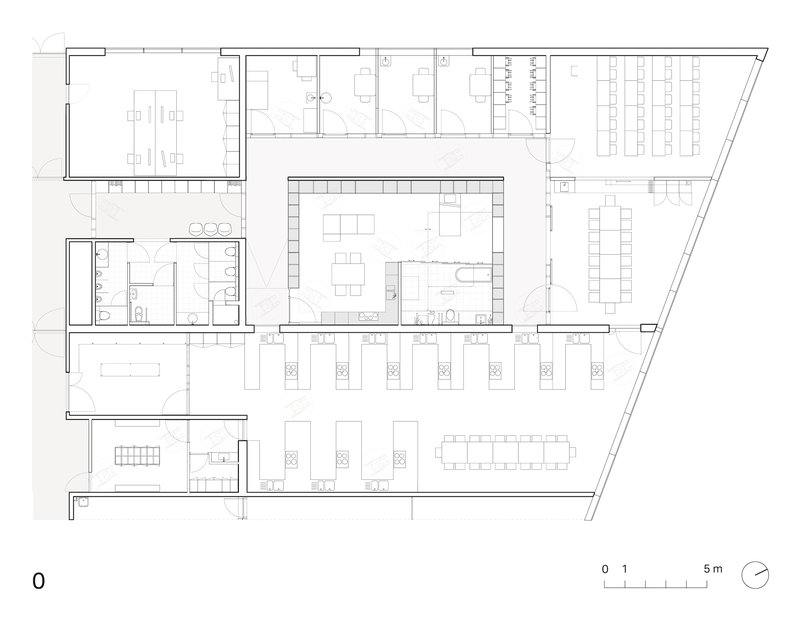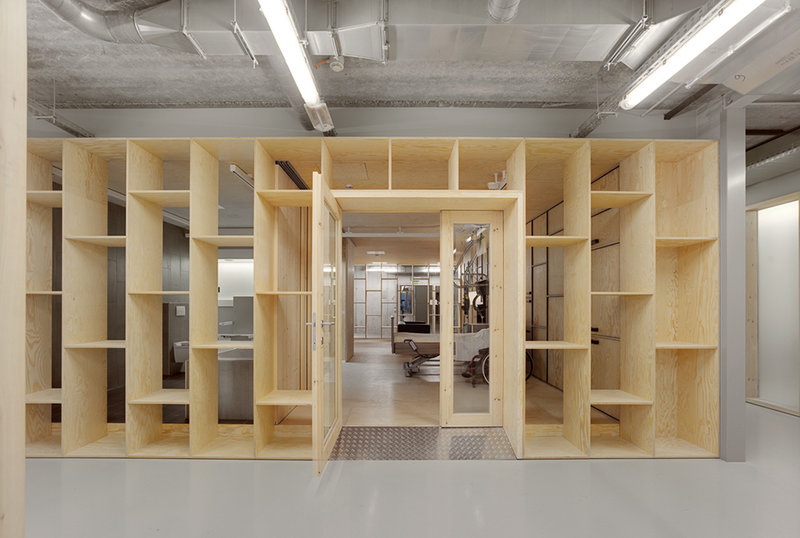Care lab
Client:
Vives Noord, Bruges
Location:
Bruges
Realization:
2016 – 2017
Design team:
David Driesen, Tom Verschueren, An-Sofie De Backer
Engineer Techniques:
ASB
Photography:
Bart Gosselin
Size:
400 m²
Care lab is a part of the university building Vives North in Bruges. The building is completed in 2009 and designed by De Vloed architects. It consists of three annexes: a relatively closed concrete plinth, a three-story building and a floating roof. Characteristic to this school building is the frequent use of exposed concrete for load bearing walls and floors.
dmvA was commissioned to transform the existing Care lab, located in the wing next to the service entrance. dmvA based its architectural concept on the contemporary vision on education. In the past, the different educational fields were kept separated and each had its own closed classroom, whereas now the aim is to stimulate cross-pollination between the different fields.
The building originally existed of three long small spans which limited the flexibility and made the circulation difficult. dmvA decided to cut through the three spaces by placing an educational care home in the middle of Care lab. Through this transformation, Care lab gets converted to a smooth network of spaces that encourages cross-pollination between the different departments. Since Care lab is used by different departments, it was important to fill in the spaces in a clever and multifunctional way. In that way Care lab has become a flexible space with multidisciplinary classrooms.
The care home, the heart of Care lab, simulates a cozy residential home, but is still abstract. Instead of using closed walls, the care home is surrounded by an open closet system. That way Care lab becomes open and accessible. The wooden structure around the care home doesn’t only serve as a half open wall but can also serve as a storage or exposition space.
The building where Care lab is located, is built in concrete. The cool and clean concrete architecture was preserved but was complemented by the use of pinewood. By adding this warm material, a homely atmosphere is created, welcoming you when you enter the building.
The building originally existed of three long small spans which limited the flexibility and made the circulation difficult. dmvA decided to cut through the three spaces by placing an educational care home in the middle of Care lab. Through this transformation, Care lab gets converted to a smooth network of spaces that encourages cross-pollination between the different departments. Since Care lab is used by different departments, it was important to fill in the spaces in a clever and multifunctional way. In that way Care lab has become a flexible space with multidisciplinary classrooms.
The care home, the heart of Care lab, simulates a cozy residential home, but is still abstract. Instead of using closed walls, the care home is surrounded by an open closet system. That way Care lab becomes open and accessible. The wooden structure around the care home doesn’t only serve as a half open wall but can also serve as a storage or exposition space.
The building where Care lab is located, is built in concrete. The cool and clean concrete architecture was preserved but was complemented by the use of pinewood. By adding this warm material, a homely atmosphere is created, welcoming you when you enter the building.








